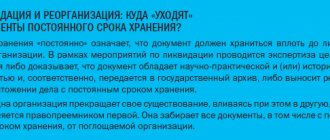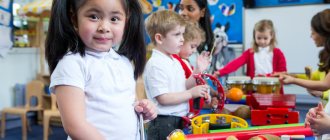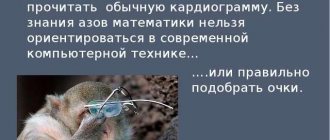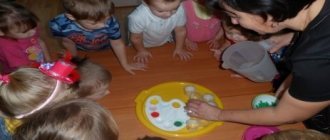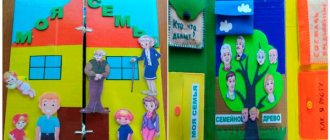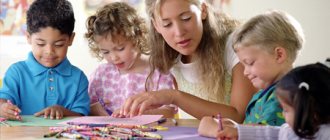Sample topics for self-education for educators
1. Activation of the vocabulary of children of the younger age group.2. The influence of educational activities directly on the play of young children.
3. The influence of oral folk art on the development of speech in children 3-4 years old.
4.Education of preschool children through work.
5. Education of moral qualities of preschool children through Russian folk tales.
6. Gender education of preschool children in a kindergarten.
7. Didactic game as a form of teaching young children.
8. Didactic games in teaching children the basics of mathematics.
9.Spiritual and moral education of preschool children.
10.Spiritual and moral education of children through reading fiction.
11.Game as a means of educational activity in the context of the implementation of the Federal State Educational Standard.
12.Game as a means of communication for preschoolers.
13. Playing activities of children at the stage of transition from early to preschool childhood.
14.Use of health-saving technologies in the first junior (second junior, middle, senior) group.
15.Use of educational games in mathematics classes with children of primary (middle, senior) preschool age.
16.Use of various non-traditional drawing techniques in working with children 2–3 years old.
17. Personality-oriented approach to the education of preschool children.
18.Methods of forming correct posture and preventing its violation in preschoolers.
19. Folk outdoor games in the physical education of preschoolers.
20. Enriching the social experience of preschoolers.
21.Health-improving gymnastics after a nap, its meaning.
22. System of work in preschool educational institutions for patriotic education.
23. Patriotic education of preschool children through the use of fine arts.
25. Outdoor play as a means of developing speed and dexterity in children of junior (middle, senior) preschool age.
26. Cognitive and research activities of preschool children.
27. Traffic rules for preschoolers.
28. Techniques for activating mental activity in the process of introducing children to nature.
29. Project activities with children of primary (middle, senior) preschool age.
30. Project method in the spiritual and moral education of preschool children.
31.Development of dialogical communication between children in a group of different ages (4-7 years).
32. Development of play activities in young children.
33. Development of communication abilities of older preschoolers through communication with nature.
34.Development of mathematical abilities of preschool children through play activities.
35.Development of fine motor skills of preschoolers.
36.Development of fine motor skills in preschool children through non-traditional drawing techniques.
37. Development of cognitive activity of preschool children.
38. Development of search and research activities of preschoolers in the process of experimentation.
39. Development of speech in children of early and primary preschool age.
40. Rhetoric lessons and speech etiquette as a means of developing the speech of preschoolers.
41.Development of sensory abilities of preschool children.
42.Development of sensory abilities through didactic games.
43.Development of children's creative abilities in visual arts.
Development of children's creative abilities using non-traditional drawing techniques.
44.Development of creative abilities of preschoolers through puppet theater.
45. Speech development of preschool children
46. The role of motor mode for the health of preschool children.
47. The role of play in the physical development and promotion of health of a preschooler.
48. The role of riddles in the development of a preschooler.
49. The role of the family in raising preschool children.
50. Fairy tale as a means of spiritual and moral education of preschool children.
51. Modern approaches to the implementation of the tasks of the educational field “Cognitive development”
.- Modern approaches to the implementation of tasks in the educational field “Speech development”
.- Modern approaches to the implementation of tasks in the educational field “Social and communicative development”
Modern approaches to the implementation of tasks in the educational field “Artistic and Aesthetic Development”
52. Theater - as a means of forming coherent speech in preschoolers.
53.Theatrical activities as a means of developing a child’s creative personality.
54. Physical development of children in play activities.
55. Physical education and health work with children.
56. Formation of communicative qualities in children of junior (middle, senior) preschool age.
57.Formation of communicative qualities in children of senior preschool age through communication with nature.
58. Formation of a culture of health in preschool children.
59. Formation of the beginnings of the ecological culture of preschool children.
60.Formation of the foundations of pedagogical skills.
61.Formation of patriotic feelings in preschoolers.
62.Formation of children's speech in play activities.
63. Fiction as a means of comprehensive development of a preschooler.
64. Artistic and speech development of children through joint theatrical activities of children and parents.
65.Environmental education of children in kindergarten.
66. Ecological development of children in the younger (middle, older) age group.
67. Activity approach in the education of preschool children
68. The influence of the developmental teaching method on the formation of the personality of a preschooler
69.Use of multimedia didactic games in the cognitive development of preschool children
Self-education of a teacher in accordance with the Federal State Educational Standard of Education
Definition 1
Self-education is the independent acquisition of new knowledge, as well as the acquisition of skills within the framework of one’s profession.
Self-education of a preschool teacher involves the need to solve the following series of problems:
- improve theoretical knowledge and pedagogical skills of all participants in educational activities;
- master new pedagogical technologies, forms and methods, methods of teaching and raising children, which ensures high quality education;
- study and introduce into practice advanced pedagogical experience, the latest achievements of pedagogical, psychological and other special sciences, new pedagogical technologies;
- develop innovative processes in preschool educational institutions;
- accumulate experience in conducting scientific, methodological and experimental work;
- organize the educational process, taking into account the development of technology and the current requirements of society.
Are you an expert in this subject area? We invite you to become the author of the Directory Working Conditions
SELF-EDUCATION PLAN “FORMATION OF THE FUNDAMENTALS OF PEDAGOGICAL SKILLS”
Municipal budgetary preschool educational institution
"Kindergarten No. 261"
Rostov on Don
SELF-EDUCATION PLAN
“FORMATION OF THE FUNDAMENTALS OF PEDAGOGICAL SKILLS”
Teacher of group No. 4
Khasanova A.N.
Rostov on Don
2021
What makes people constantly work on themselves, expand their knowledge, and engage in self-education? Science, technology, production are developing and improving continuously. Scientists say that the knowledge that humanity has doubles every 10 years. Consequently, previously acquired knowledge may become outdated. In the modern world, there is a noticeable increase in the social role of education, which is becoming the main resource of society. Strengthening intellectual potential, which is based on the priority of the self-worth of a person capable of self-development, is one of the important tasks of education.
In order to keep up with the times, a teacher must constantly improve his knowledge, master progressive pedagogical technologies of education and training, and thereby provide an opportunity for his development. The system of continuous professional development for preschool teachers involves different forms: training in courses; self-education; participation in the methodological work of the city, district, kindergarten.
Self-education is the independent acquisition of knowledge from various sources, taking into account the interests and inclinations of each individual person. As a process of acquiring knowledge, it is closely related to self-education and is considered its integral part. Self-education helps you adapt to a changing social and political environment and fit into the context of what is happening.
Self-education allows you to carry out and concretize your knowledge, carry out a deep and detailed analysis of situations that arise when working with children. A teacher who has the skills of independent work has the opportunity to prepare and move on to targeted scientific, practical, research activities, which indicates a higher professional and educational level, and this, in turn, affects the quality of the educational process and the effectiveness of teaching activities. Well, the base, of course, should be pedagogical skill.
“Master” (translated from Latin as boss, teacher) is a person who has achieved a high level of perfection and creativity.
Mastery (the highest level of professionalism) is a complex of personality qualities that ensure a high level of teaching activity. Mastery in one's creative activity is deeply individual, but several types of pedagogical mastery can be distinguished:
— personal qualities of the teacher: high moral character, responsibility, conscientiousness, hard work, fairness, love for children, teaching abilities, patience, perseverance, endurance, optimism, sense of humor;
- professional pedagogical technique - a set of skills, abilities, techniques.
Components of pedagogical technology:
- the teacher’s ability to manage his behavior; mastery of facial expressions and pantomime; managing emotions and mood; socially perceptive abilities (abilities that allow one to understand the subject of pedagogical influence): attention, observation, imagination.
- ability to influence individuals and teams.
Below is a work plan for developing teaching skills.
- FULL NAME. teacher – Khasanova Anastasia Nikolaevna
- Education – higher – technical, preschool teacher,
- The topic of self-education is “Formation of the foundations of pedagogical skills.”
- Work started - 09/01/2021
- Expected completion: 05/30/2022.
- Goal: improve your professional level.
- Tasks: .
study and implement the program “From birth to school” in all educational
regions
- develop long-term plans
- develop a project on patriotic education
- implement the project in educational activities
- Expected result: assessment of pedagogical values, formation of pedagogical
mastery, desire to improve the teaching process.
9. Form of self-education: individual.
10. Actions and activities carried out in the process of working on the topic:
* study of literature on the topic;
* visiting educational activities with teachers of your preschool educational institution;
* attending teacher councils, seminars, conferences;
* self-analysis and self-assessment of teaching activities in the group;
* implementation of the project on patriotic education in practice;
* conducting a series of open sessions for analysis by colleagues;
* summarizing the results at a meeting of the methodological association
* work with parents: consultations, conversations, exhibition of joint works.
11. Form of report on the work done: message at the teachers’ meeting, presentation
for teachers of your preschool educational institution.
WORK PLAN FOR THE YEAR
| Plan section | Deadlines | Form of work | Practical solutions |
| 1. Study of methodological work on the topic | “Fundamentals of Pedagogical Mastery”, ed. I.A.Zyazyuna, M., 1989 “Pedagogical artistry”, O.S. Bulatov: Academy, 2001 “The skill of a teacher”, Yu.P. Azarov. Enlightenment, 1971 | Evaluation, analysis, acceptance of experience | |
| 2. Methodological work on self-education | September-May | 1. Participation in methodological associations at the municipal level | Reports, abstracts, workshops |
| September-May | 2. Viewing the forms of educational activities at the kindergarten level | Conversations, consultations, viewing | |
| February March | 3. Participation in the professional skills competition for teachers of preschool educational institutions (kindergarten level) | Open review, analysis and self-reflection | |
| March | 4. Consultation for teachers of preschool educational institutions on the topic “Formation of the foundations of pedagogical skills” | Consultation, conversation, recommendations | |
| 3. Working with children | September-May | 1. Search for effective methods of work during joint activities of an adult and a child | GCD, conversations, games |
| September-May | 2. Self-analysis of teaching activities | Self-analysis, self-esteem | |
| September - May | 3. Preparation and implementation of the project “Where the Motherland Begins” | Conversations, quizzes, games, riddles, exhibitions of joint works, excursions, entertainment, leisure activities | |
| 4. Working with parents | Aug. Sept | 1. Developing a plan for working with parents for the year | Work plan |
| December | 2. Preparation and holding of the parent meeting “Mom’s Mistakes” | Conversation with parents, consultation, exchange of opinions, recommendations, meeting minutes | |
| May | 3. Participation in the preparation and holding of the final parent meeting | Final results for the year, exchange of opinions, exhibition of children's works, open day, conversation with parents, minutes of the meeting |
Requirements for the preparation of documentation for self-education
Self-education documentation should be filed in a binder and divided into the following sections:
- A title page that should indicate:
- full name of the educational institution;
self-education materials;
- Full name of the teacher, his qualification category;
- the topic of self-education.
- Content;
- Topic, purpose of the work and main tasks that must be solved in the process of self-education activities;
- Expected results;
- Work plan drawn up for the academic year;
- Implementation of acquired knowledge in practice. Teachers can do this in the following ways:
- holding an open lesson;
preparation and holding of the seminar;
- conducting a master class for teachers on a chosen topic;
- design of a moving folder;
- compiling a collection of advice for parents, etc.
- Bibliography
Forms of self-education for preschool teachers
Self-education of a kindergarten teacher is a multifaceted and diverse activity that can be implemented in different forms, the main of which are:
- study regulatory documents, scientific, methodological and special literature;
- study the advanced pedagogical experience that has been accumulated by the preschool education system;
- attend open classes of colleagues and carry out their further analysis;
- develop programs, didactic material, teaching aids;
- participate in various forms of methodological work at different levels;
- try in practice forms, means, methods of teaching and education;
- analyze the results of your own work;
- take advanced training courses.
Self-education of educators complies with state standards and requires maintaining a certain set of documentation. The teacher should create a methodological folder in which he will collect useful and interesting articles on the chosen topic, notes of interest on direct educational activities, examples of fiction, riddles, photographs from events, etc.
Finished works on a similar topic
Course work Self-education of a kindergarten teacher 420 ₽ Abstract Self-education of a kindergarten teacher 240 ₽ Test paper Self-education of a kindergarten teacher 230 ₽
Receive completed work or specialist advice on your educational project Find out the cost
Be sure to develop a work plan for self-education for the academic year, which helps to optimize future activities and bring them into a coherent system. The teacher’s responsibilities are also to regularly fill out a folder for his self-education.
In addition to the annual plan, there is a long-term plan for education, which outlines the work on a particular topic for several years in advance.
Self-education should not be perceived only as filling out notebooks, planning and preparing consultations, designing stands, etc. First of all, it represents stimulation of professional growth, as well as personal development of the teacher.
Preparatory group. Senior preschool age. Children 6-7 years old
Self-education program “Development of speech of senior preschool age children through play activities” Educator: Kolpakova E.I. 2022 – 2022 academic year d. Goal: to study the ways, methods and techniques of activating the speech of preschool children, to unite the efforts of teachers and...
Self-education of the teacher of the preparatory group “Theatrical activities as a means of developing the speech of preschoolers” Self-education of the teacher of the preparatory group on the topic “Theatrical activities as a means of developing the speech of preschoolers”
Children's whole life is filled with play. Every child wants to play their role. Teach a child to play, take on a role and act, at the same time...

